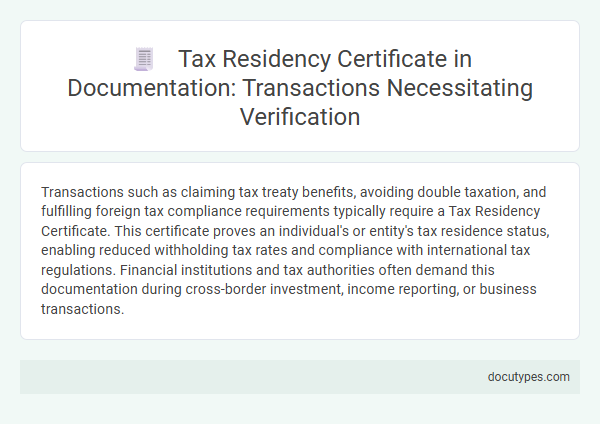Transactions such as claiming tax treaty benefits, avoiding double taxation, and fulfilling foreign tax compliance requirements typically require a Tax Residency Certificate. This certificate proves an individual's or entity's tax residence status, enabling reduced withholding tax rates and compliance with international tax regulations. Financial institutions and tax authorities often demand this documentation during cross-border investment, income reporting, or business transactions.
Introduction to Tax Residency Certificates
| Introduction to Tax Residency Certificates |
|---|
| A Tax Residency Certificate (TRC) is an official document issued by tax authorities to certify an individual's or entity's tax residence status in a specific country. This certificate helps prevent double taxation and ensures compliance with international tax laws. It serves as proof that the holder is subject to tax regulations in their resident jurisdiction. |
| Types of Transactions Requiring a Tax Residency Certificate |
|
Importance of Tax Residency in Documentation
Tax residency certificates are crucial for various financial and legal transactions requiring proof of your tax status. Common transactions include claiming tax treaty benefits, avoiding double taxation, and compliance with foreign tax laws.
Tax residency documentation ensures accurate tax withholding and establishes eligibility for reduced tax rates. Your certificate validates your residency status and is essential when dealing with banks, investment accounts, and cross-border income reporting.
Key Transactions Requiring Tax Residency Verification
A Tax Residency Certificate is essential for verifying your tax status during specific financial transactions. It ensures compliance with domestic and international tax regulations.
- Cross-Border Investments - Proof of tax residency is required to claim treaty benefits and avoid double taxation on foreign investments.
- Dividend Payments - Financial institutions require a Tax Residency Certificate to apply the correct withholding tax rate on dividends paid to non-residents.
- Loan Agreements - Lenders may request this certificate to confirm tax obligations and eligibility for reduced tax rates under tax treaties.
Obtaining a Tax Residency Certificate streamlines tax processing and prevents unnecessary withholding taxes on your transactions.
Legal Basis for Tax Residency Certificate Requirement
Tax residency certificates are required for transactions involving cross-border income to establish the taxpayer's residence status under double taxation avoidance agreements. These certificates serve as proof to claim treaty benefits and avoid withholding tax discrepancies.
The legal basis for requiring a tax residency certificate is grounded in tax treaties, domestic tax laws, and international tax regulations. You must present this certificate for transactions such as dividend payments, interest income, royalties, and capital gains to validate your tax residency status.
Essential Information in a Tax Residency Certificate
A Tax Residency Certificate is essential for transactions involving cross-border income to avoid double taxation. It verifies an individual's or entity's tax residence status, enabling eligibility for reduced tax rates under double tax agreements. Common transactions requiring this certificate include dividend payments, interest earnings, and royalty transfers.
Application Process for Obtaining a Tax Residency Certificate
A Tax Residency Certificate (TRC) is essential for specific cross-border transactions to avoid double taxation and claim treaty benefits. Understanding the application process ensures timely acquisition and compliance with tax regulations.
- Identify Eligibility - Confirm the applicant meets residency criteria based on local tax laws before applying.
- Gather Required Documents - Collect proof of residency, identification, and relevant financial statements necessary for the application.
- Submit Application - Apply through the designated tax authority portal or office, following official guidelines and paying any applicable fees.
Cross-Border Transactions and Tax Residency Proof
Cross-border transactions often require a Tax Residency Certificate (TRC) to verify the taxpayer's residence status for tax relief or exemption purposes. This certificate helps prevent double taxation and ensures compliance with international tax treaties.
Common transactions requiring a TRC include dividends, interest, royalties, and capital gains that cross national borders. Financial institutions and tax authorities typically request the TRC as proof of tax residency before applying reduced withholding tax rates. Providing the TRC facilitates smooth transaction processing and protects taxpayers from excessive taxation.
Common Challenges in Tax Residency Documentation
Tax residency certificates are essential for various financial and legal transactions to establish your tax status in a specific jurisdiction. These certificates help prevent double taxation and ensure compliance with international tax regulations.
- Cross-border Investments - Proof of tax residency is required to benefit from tax treaties and avoid higher withholding taxes on dividends and interest.
- Property Transactions - When buying or selling real estate abroad, tax authorities often demand residency certification to apply correct tax rules.
- Employment Income Reporting - Employees working internationally must provide tax residency certificates to their employers for proper tax withholding and compliance.
Common challenges in obtaining these certificates include complex documentation requirements, delays in issuance from tax authorities, and inconsistencies in residency definitions across different countries.
Regulatory Compliance and Verification Procedures
What types of transactions require a tax residency certificate? Tax residency certificates are essential for cross-border transactions, including dividend payments, interest, and royalty transfers, to claim tax treaty benefits. These certificates ensure regulatory compliance by verifying the taxpayer's residency status and preventing double taxation.
Which regulatory compliance requirements mandate the submission of a tax residency certificate? Financial institutions and tax authorities require tax residency certificates to validate foreign taxpayers' claims for reduced withholding tax rates. Verification procedures involve authenticating the certificate's validity to prevent fraud and ensure adherence to bilateral tax agreements.
What Types of Transactions Require a Tax Residency Certificate? Infographic

